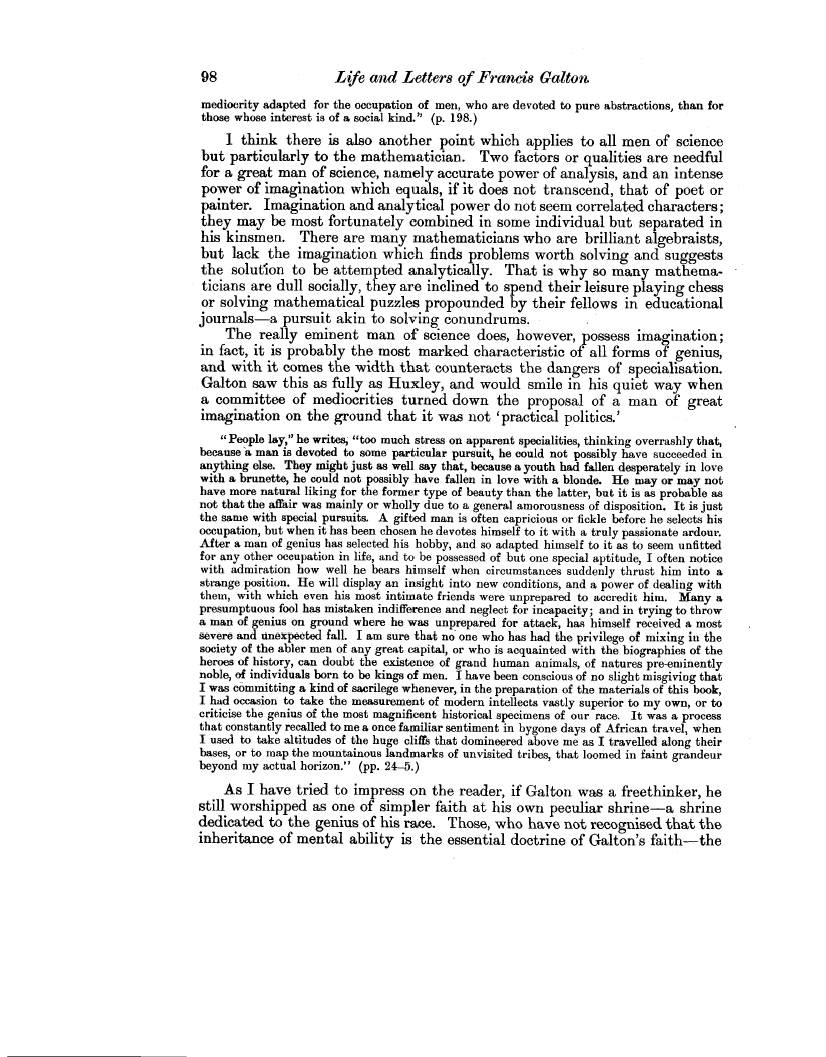98 Life and Letters of Francis Galton
mediocrity adapted for the occupation of men, who are devoted to pure abstractions, than for those whose interest is of a social kind." (p. 198.)
I think there is also another point which applies to all men of science but particularly to the mathematician. Two factors or qualities are needful for a great man of science, namely accurate power of analysis, and an intense power of imagination which equals, if it does not transcend, that of poet or painter. Imagination and analytical power do not seem correlated characters; they may be most fortunately combined in some individual but separated in his kinsmen. There are many mathematicians who are brilliant algebraists, but lack the imagination which finds problems worth solving and suggests the solution to be attempted analytically. That is why so many mathematicians are dull socially, they are inclined to spend their leisure playing chess or solving mathematical puzzles propounded by their fellows in educational journals-a pursuit akin to solving conundrums.
The really eminent man of science does, however, possess imagination; in fact, it is probably the most marked characteristic of all forms of genius, and with it comes the width that counteracts the dangers of specialisation. Galton saw this as fully as Huxley, and would smile in his quiet way when a committee of mediocrities turned down the proposal of a man of great imagination on the ground that it was not `practical politics.'
"People lay," he writes; "too much stress on apparent specialities, thinking overrashly that, because a man is devoted to some particular pursuit, he could not possibly have succeeded in anything else. They might just as well say that, because a youth had fallen desperately in love with a brunette, he could not possibly have fallen in love with a blonde. He may or may not have more natural liking for the former type of beauty than the latter, but it is as probable as not that the affair was mainly or wholly due to a general amorousness of disposition. It is just the same with special pursuits. A gifted man is often capricious or fickle before he selects his occupation, but when it has been chosen he devotes himself to it with a truly passionate ardour. After a man of genius has selected his hobby, and so adapted himself to it as to seem unfitted for any other occupation in life, and to be possessed of but one special aptitude, I often notice with admiration bow well he bears himself when circumstances suddenly thrust him into a strange position. He will display an insight into new conditions, and a power of dealing with theut, with which even his most intimate friends were unprepared to accredit him. Many a presumptuous fool has mistaken indifference and neglect for incapacity; and in trying to throw a man of genius on ground where he was unprepared for attack, has himself received a most severe and unexpected fall. I am sure that no one who has had the privilege of mixing in the society of the abler men of any great capital, or who is acquainted with the biographies of the heroes of history, can doubt the existence of grand human animals, of natures pre-eminently noble, of individuals born to be kings of men. I have been conscious of no slight misgiving that I was committing a kind of sacrilege whenever, in the preparation of the materials of this book, I had occasion to take the measurement of modern intellects vastly superior to my own, or to criticise the genius of the most magnificent historical specimens of our race. It was a process that constantly recalled to me a once familiar sentiment in bygone days of African travel, when I used to take altitudes of the huge cliffs that domineered above me as I travelled along their bases, or to map the mountainous landmarks of unvisited tribes, that loomed in faint grandeur beyond my actual horizon." (pp. 24-5.)
As I have tried to impress on the reader, if Galton was a freethinker, he still worshipped as one of simpler faith at his own peculiar shrine-a shrine dedicated to the genius of his race. Those, who have not recognised that the inheritance of mental ability is the essential doctrine of Galton's faith-the

